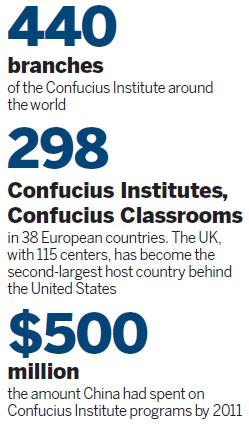Chinese universities that are partners with the Confucius Institute usually supply directors and teachers, but some of those universities may have partnerships with three or more Confucius Institutes.
As the organization expands, it's moving beyond being simply a provider of language instruction.

At Goldsmiths Confucius Institute for Dance and Performance in London, language learning plays a secondary role. That institute, opened two years ago, is, like the Institute of Education, part of the University of London, and is the first Confucius Institute anywhere to specialize in bringing Chinese dance and performing arts to its host university.
"Through introducing students to the arts of China and through raising awareness of Chinese culture, we have created an opportunity for students to gain a better understanding of China," according to Annie Guo, director of Goldsmiths Confucius Institute for Dance and Performance.
"We offer a varied range of courses, such as Chinese dance, music, martial arts, tai chi and cultural awareness training to enable a greater exposure to the Chinese culture and heritage.
"Due to Goldsmiths' strengths in the arts and humanities, this was a beneficial match to the advantage of both Goldsmiths and Hanban UK."
More than 600 students are enrolled in the institute's programs at Goldsmiths, and it plans to expand courses available by next year, she said.
The college now offers a Bachelor of Arts in International Studies and Chinese, and plans to extend its Confucius Institute operations to take in four separate degree courses at the university.
Beyond the college classroom, Guo said, a goal for the center is to spread the joy of Chinese culture through music, dance and tai chi beyond the campus and into the community.
Goldsmiths has created a teacher training program that will help establish a foundation so more teachers, outside the realm of Confucius Institutes, can propagate Chinese culture throughout Britain.
"With the Imperial Society of Teachers of Dancing, we have created a teacher training program," Guo said. "We are the first organization to professionally offer this teacher training program of Chinese dance in the UK, which will offer collaborative benefits to Goldsmiths as well as benefiting the local community."
In a similar first, London South Bank University opened a Confucius Institute for traditional Chinese medicine in 2009. It was the first such course in a Confucius Institute, and is offered in conjunction with Heilongjiang University of Chinese Medicine and Harbin Normal University.
There are now more than half a dozen Confucius Institutes in Europe and the US specializing in traditional Chinese medicine.
Business mediation
In addition to its role as an educator, the institute has become a business mediator through which research and exchanges with Chinese companies and other businesses can be arranged.
At the Confucius Institute of University College Dublin, opened in 2006, the first in Ireland, research plays a large part in helping local businesses better understand China.
"One of the key objectives of the institutes is to develop an international research profile in Chinese studies, and to facilitate the development of economic and cultural links between Ireland and China," said Professor Wang Liming, assistant to the president and director of the Dublin institute.
"To that end, the institutes have supported three survey research projects which aim to identify the needs and demand of Irish business, university students and post-primary school students for Chinese studies and help Irish higher education to take up the challenge of meeting the increasingly higher demand."
They have since helped to connect almost a dozen local Irish businesses with China.
The university began building Confucius Institute premises covering 2,000 square meters this month. The university plans to use the center to bolster research and language instruction, and include with it a new executive training program.
Even as European schools reap the benefits of the Confucius Institute's language instruction, the institutes are helping to improve China's own education system.
At Suzhou Industrial Park in Suzhou, Jiangsu province, Xi'an Jiao Tong University collaborated with the University of Liverpool in the UK to create a joint-venture school in 2006.
The university, with more than 7,000 students and a 527 million yuan ($84 million) learning center opened in 2011, hopes to become one of the premier universities in China.
"All classes are taught in English and recruitment is from the top half of the highest band of the gaokao, (the university entrance exam), so admission standards are equal to the very best Chinese universities," said Ann Smith, deputy director of the Confucius Institute at Liverpool University, who added that the university hopes to double the number of Chinese students enrolled to 15,000 by 2017.
In the UK, the Liverpool Confucius Institute is used as a community center and a way to help Chinese students adapt to university life in the West.
Liverpool University is surrounded by one of the oldest Chinese communities in the UK, dating back more than 120 years. A Liverpool City Council member serves on the local Confucius Institute board.
The institute frequently hosts community events, most notably Chinese New Year celebrations.
Smith said: "Liverpool's Confucius Institute also addresses the issue of integrating its Chinese students by organizing conversation exchange events, which pair native English speakers with Chinese students to their mutual benefit, enabling them to improve their language skills and share social and cultural experiences."
We recommend:
